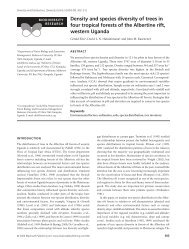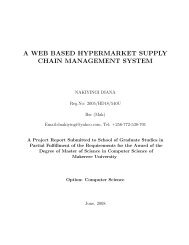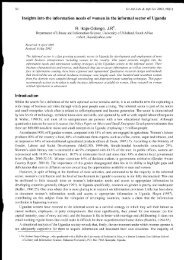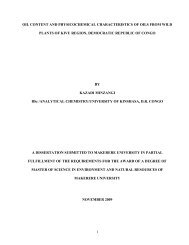THE UNIVERSITY OF LEIPZIG
THE UNIVERSITY OF LEIPZIG
THE UNIVERSITY OF LEIPZIG
Create successful ePaper yourself
Turn your PDF publications into a flip-book with our unique Google optimized e-Paper software.
do not necessarily reflect the concerns of a village as a whole, particularly in matters<br />
concerning public resources such as Kakamega forest, streams, pastures or public works.<br />
While such groups are often treated as if they were representative, more often they are not.<br />
They represent the particular interests of an elite leadership. This scenario is confirmed by<br />
Ribot who examined representation in natural resource decentralizations in 15 countries. He<br />
found out that:<br />
Across all the cases, where you had the transfer of powers to local institutions, those<br />
institutions were upwardly accountable, almost systematically. When you found<br />
downwardly accountable institutions, they had no significant, meaningful discretionary<br />
powers. 415<br />
Regarding powers over decision–making we noted that, since the beginning of participatory<br />
efforts in Kakamega in the 1990s, little and no real participation has been effected. Rather,<br />
local populations have been viewed as “objects of development”, to be educated, informed<br />
and guided. In this regard we observed that the only participants in development have been<br />
the international experts through international NGOs, politicians, and national technocrats<br />
often located at district and provincial local governments in form of Forest Extensities officers<br />
and Wildlife Service agents.<br />
A scenario related to the above was analysed by Engberg-Pedersen while studying<br />
decentralisation and natural resource management in the Sahel region, particularly in Bokina<br />
Faso and Mali. 416 He found out that natural resource management committees of the closely<br />
related village common projects set up by donors across Burkina Faso to be undemocratic,<br />
arguing that they did not represent village populations, owing to the lack of a locally rooted<br />
institutionalised process. 417 The situation that obtains in Kakamega district depicts little or no<br />
representational over forest resource disposition. No power is devolved to local communities.<br />
Hence power over decision-making such as fixing minimum environmental standards which<br />
should be devolved remains officially located with the Forest Service. No realm of<br />
autonomous decision-making is specified.<br />
The existence of such a malfunctional and unrepresentative process creates unintegrated<br />
institutional framework in the management of environmental and biodiversity resources in<br />
Kakamega district. When it comes to participation in the terms of production, management as<br />
well as benefit sharing in form of revenue generated from sale of forest products, licences and<br />
related eco-tourism services, it was found out that no such mechanisms existed at all.<br />
Kenya’s new forestry laws stipulate an institutional structure regarding local management of<br />
biodiversity resources related to forestry. The law somewhat assigns shared responsibility<br />
regarding forest management to local governments as well as the local community therein<br />
415<br />
Ribot Ribot, J.C. 1996. Participation without representation: Chiefs, Councils and Forestry Lwas in Western<br />
African Sahel. Cultural Survival Quarterly20(1): 40-44.<br />
416<br />
Engberg-Pedersen, L. 1995. Creating Local Democratic Politics from above: the "gestion des terroirs"<br />
approach in Burkina Faso. Mimeo Working paper.<br />
417<br />
Evans, Peter B. 1997. The eclipse of the state? Reflections on Stateness in an era of Globalisation', Worm<br />
Politics 50:62-87.<br />
86






